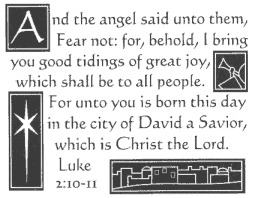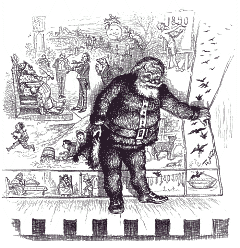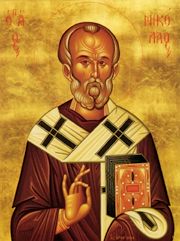 Santa
or Satan? A Reply to a Funny Fundamentalist on the History of Santa
Claus, from FidoNet (Christmas 1994) Santa
or Satan? A Reply to a Funny Fundamentalist on the History of Santa
Claus, from FidoNet (Christmas 1994)
Date: 12-24-94 / From: P / To: RICHARD CLARK / Subj: The Real Santa Claus RC> Who is Santa Claus? Where did he come from? Why is he here? >> Good questions, Richard. Have you ever tried to find any answers? It sure doesn't look like it from your posts here. RC> What should you teach your children? These are some of the questions we are going to answer in this Bible-Believers Guide of Santa Claus at X-Mass. >> According to Richard Clark, Santa is a FALSE GOD --
"Loved" is one thing. Worshipped? I don't think so, Richard. Also according to Richard Clark, Santa Claus = SATAN CLAWS? Who could it be....I just can't imagine who..... Could it beeeeeeeeeeeeeeeeeeee............. [SNL "Church lady"] RC> Who is Santa? Move the "n" from the middle of that name to the end, and what does it spell? "And no marvel; for Satan himself is transformed into an angel of light." (2 Cor.11:14) >> "How conveeeeeeeeeeenient."
"Well, isn't that special?" I gotta ask you -- are you serious, man? RC> Is this the expression YOU use: "I was just kidding, can't you take a joke?" ("Ha ha.") >> That's what I was hoping, Richard. But I think you ARE serious. RC> SO MILLIONS OF CHILDREN all over the world are taught that Santa is real, and are deceived just as easily as the serpent deceived Eve in the Garden. >> Come on, Richard. Do some historical study here. [ Picture below is from Thomas Nast's Christmas Drawings for the Human Race, 1889 -- Nast is credited with the origin of the famous "red suit" of Santa ]
The REAL Santa Claus is no false god, certainly not Satan, Richard! From an article in THIS ROCK -- the magazine of Catholic apologetics CHRISTMAS ("Christ-Mass") is when the Church confesses the shocking scandal of the Incarnation. It is the scandal that the Second Person of
the Trinity, the only Son of God, true God from true God and one in being with the Father, became flesh and dwelt among us (John
1:1,14). As a witness to this profound mystery, Christmas has rightly held a lofty place among the feasts of Christendom. Objections to Christmas aren't confined to the pagan elements of the holiday, as evidenced by the antagonism to jolly old Saint Nick, who lacks heathen ties altogether, though some suspect even here a hidden Babylonian connection. The main complaint is that Saint Nicholas, alias Santa Claus, detracts from the purpose of the season, which ought to be centered upon Christ. Children can name all of Santa's reindeer starting with Rudolph, but they grow up learning nothing of the central mystery of our redemption. This is a valid concern, yet we must take care not to throw the proverbial baby out with the bath water. There is benefit in contemplating the life of the historical 'Santa Claus.'
He is said to have suffered under the Diocletian persecution, been an opponent of Arianism, and been present at the Council of Nicaea. His death probably occurred at Myra in 342, and the Byzantine Emperor Justinian built a church in his honor at Constantinople in the suburb of Blacharnae during the sixth century. His feast day being December 6 explains his association with Christmas, though his reputed opposition to Arianism, a heresy rooted in the denial of the Incarnation, makes the connection quite fitting. Once understood, the life of 'Santa Claus' is a model for us to follow. Santa's red suit is possibly derived from his eastern episcopal attire, though it was American cartoonist Thomas Nast, an anti-Catholic who let his prejudice be enshrined in his drawings, who in 1863 created the fur-trimmed suit we now associate with Santa Claus. Dutch settlers to America brought the custom of giving gifts to children on St. Nicholas' Eve, and British settlers took over the tradition as part of their Christmas Eve celebration. The name 'Santa Claus' is the Americanized version of the Dutch 'Sinterklaas,' itself a modification of 'Sint Nikolaas.'" (THIS ROCK December 1993, "The Antichrist at the Manger" [full article] by Terry L. Frazier, Catholic convert from Evangelicalism) Available from Catholic Answers, www.Catholic.com RC> And you have heard that Santa is the "spirit" of Christmas, but the Bible says "every spirit that confesseth not that Jesus Christ IS come in the flesh is NOT of God: and this is that spirit of antichrist, whereof ye have heard that it should come; and even NOW ALREADY it is in the world" (1 Jn 4:3) >> And since St. Nicholas defended the Incarnation against Arianism he certainly would affirm 1 John 4:1-3 (cf. John 1:1,14). RC> Does Santa have eternal life? How old is Santa anyway? >> We can assume a Christian bishop who defended the deity of Christ at the Council of Nicaea certainly has eternal life (John 3:36; 5:24). RC> And YOU? Do YOU have ETERNAL LIFE? >> Every Christian who confesses Christ as Savior has eternal life (Rom 10:9-10; 1 John 5:11-13). RC> ....they say that Santa comes at NIGHT and leaves gifts; So why wouldn't children love Santa more than God, since they are NOT taught that God has a GREATER GIFT: The FREE gift of eternal life in Christ Jesus. >> Amen. Let all Christian parents teach their children about the REAL Santa Claus, St. Nicholas, a Christian bishop of the fourth century known for his charity with children, and one who emphatically affirmed that eternal life is found in Jesus Christ. RC> And today, almost 2000 years later, parents put their children in Santa's Arms and the children look at Santa with AWE and tell him their prayers and wishes for toys or whatever, and he smiles and puts hands upon them and says Ho Ho and sends them on their merry way to Hell. >> Please, Richard, please don't tell us what you think of the Tooth Fairy next. Please, noooooo....... :) RC> Who is Santa Claus? Where did he come from? Why is he here? What should you teach your children? >> From the CHRISTIAN RESEARCH NEWSLETTER (Nov/Dec 1993) article "Is Christmas Christian?" by Hank Hanegraaff Question: Another common question involves Santa Claus. Is Santa a hopelessly pagan concoction, or can Santa be saved? Answer: What few people seem to be aware of is that Santa is Christian rather than pagan in origin. As a matter of fact, Santa Claus is an Anglicized form of the Dutch name, Sinter Klaas. Sinter Klaas in turn represents a Christian bishop of the fourth century named "Saint Nicholas." According to tradition, Saint Nick was not only kind and generous towards children but he apparently attended the Council of Nicea in A.D. 325, where he supported the biblical doctrine of the Trinity. While it is likely true that Saint Nick gave toys to tots, it's obviously pure mythology that he presently lives at the North Pole in a toy factory, knows if we've been bad or good, and flies around in a sled pulled by reindeer. In truth, Santa is not essential to Christmas -- but he does represent an excellent opportunity for sharing Christ with your kids. Why not ask them this Christmas if they know who Santa really was. Perhaps not only Santa can be saved but so will one or more of your loved ones. From CHRISTIAN RESEARCH NEWSLETTER, volume 6, issue 5 (Nov/Dec 1993) Available from Christian Research Institute, www.Equip.org P |
 RC>
The faith of a Child! And they grow up and find out that the god that
they have been taught about called Santa is FALSE and what happens to
them then? ... But ONLY the LORD GOD is RIGHTEOUS. Santa is a FALSE god.
WHY are children being taught to disobey the commandment: "Thou
shalt have no other gods before me"(Exodus 20:3)? ...But if you
don't believe - and you won't if you are trusting in another god - Santa
is a FALSE god. "Be NOT deceived" (Gal.6:7). ...Millions of
boys and girls each year wait with expectancy and patience for the
glorious appearing of the great Santa-god. ...And children WORSHIP
Santa. He is worshipped and loved by thousands of children the world
around. >>
RC>
The faith of a Child! And they grow up and find out that the god that
they have been taught about called Santa is FALSE and what happens to
them then? ... But ONLY the LORD GOD is RIGHTEOUS. Santa is a FALSE god.
WHY are children being taught to disobey the commandment: "Thou
shalt have no other gods before me"(Exodus 20:3)? ...But if you
don't believe - and you won't if you are trusting in another god - Santa
is a FALSE god. "Be NOT deceived" (Gal.6:7). ...Millions of
boys and girls each year wait with expectancy and patience for the
glorious appearing of the great Santa-god. ...And children WORSHIP
Santa. He is worshipped and loved by thousands of children the world
around. >> RC>
And when the Lord Jesus was tempted of Santa (correction: Satan) in the
wilderness.... (Matt 4:10) ...And up pops Satan (Correction:
Santa) Claus, with white hair and beard and a red suit - a FAKE saviour.
...So since the LORD comes from the North, then of course the Santa-god
would do the same. The Bible says of Santa (Correction: Satan) ...(Isa
14:13) So Satan's (Correction: Santa's) workshop is "said to
be" in the NORTH! ....and not be ashamed if you are teaching your
children to be ready to meet Santa (Satan). They'll grow up and DIE, and
BURN in the lake of FIRE FOREVER. >>
RC>
And when the Lord Jesus was tempted of Santa (correction: Satan) in the
wilderness.... (Matt 4:10) ...And up pops Satan (Correction:
Santa) Claus, with white hair and beard and a red suit - a FAKE saviour.
...So since the LORD comes from the North, then of course the Santa-god
would do the same. The Bible says of Santa (Correction: Satan) ...(Isa
14:13) So Satan's (Correction: Santa's) workshop is "said to
be" in the NORTH! ....and not be ashamed if you are teaching your
children to be ready to meet Santa (Satan). They'll grow up and DIE, and
BURN in the lake of FIRE FOREVER. >> The
REAL Santa Claus (i.e. Saint Nicholas) is rooted in Christian church
history. St. Nicholas was the bishop of Myra in Lycia who opposed
Arianism and was present at the Council of Nicaea (325 A.D.), the Church
council called to defend and define clearly the deity of our Lord Jesus
Christ.
The
REAL Santa Claus (i.e. Saint Nicholas) is rooted in Christian church
history. St. Nicholas was the bishop of Myra in Lycia who opposed
Arianism and was present at the Council of Nicaea (325 A.D.), the Church
council called to defend and define clearly the deity of our Lord Jesus
Christ. Nicholas
was the bishop of Myra in Lycia (southwestern Asia Minor) at the
beginning of the fourth century. He's remembered for his charity to the
poor and has long been regarded in the West as the special patron of
children, probably due to a tale about him reviving three children from
the dead. [ Picture to the right is an Orthodox icon of St. Nicholas,
courtesy of
Nicholas
was the bishop of Myra in Lycia (southwestern Asia Minor) at the
beginning of the fourth century. He's remembered for his charity to the
poor and has long been regarded in the West as the special patron of
children, probably due to a tale about him reviving three children from
the dead. [ Picture to the right is an Orthodox icon of St. Nicholas,
courtesy of